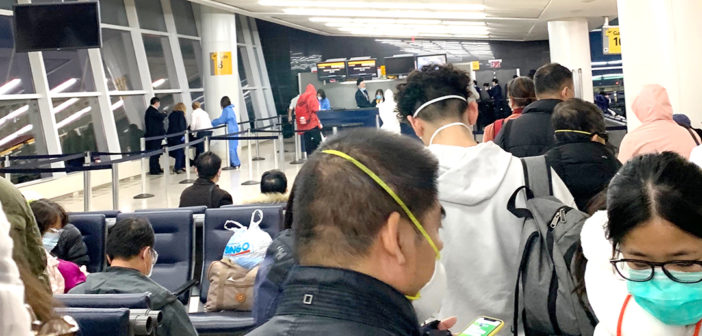Lehigh’s emergency aid fund has worked to assist students with financial burdens caused by the coronavirus pandemic.
Providing aid to students has been a collaborative effort between the Financial Aid Office and the Dean of Students, said Jennifer Mertz, assistant vice provost for financial aid.
The majority of requests have been for travel, technology and meals, Mertz said.
As of March 26, the Financial Aid Office has processed over 50 requests for emergency aid and approved over $40,000 in funding, not including travel and technology requests, Mertz said.
She said the idea of an emergency aid fund is not new to Lehigh, and the emergency aid fund has existed for about three years. Mertz said the money in the fund comes from crowdfunding requests and the initial donor who created the fund.
“It’s basically sending money that we haven’t quite raised yet, but have the hope to raise from donors, essentially,” said Mertz.
Mertz said she looks at the financial aid application that students submitted at the beginning of the academic year to determine their financial needs, and whether or not they are eligible to receive emergency aid.
In the beginning, a lot of the emergency aid requests were for transportation and flights home. Since many students were on spring break when Lehigh announced the semester would be moved to remote learning, students had to fly to locations they normally wouldn’t have to, due to flight restrictions or last minute changes, Mertz said.
Raihan Alam, ‘23, lives in San Francisco. He said his dad works as an Uber driver and has been receiving less business due to coronavirus.
After learning Lehigh would move to remote learning for two weeks, he said he reached out to the Financial Aid Office to see if he could receive funding to fly home without worrying about the financial burden.
Originally, Alam was told his request was denied.
“There was no way I could fly (home) and come back in two weeks,” he said. “That kind of did piss me off.”
Alam said it was scary when his aid was denied, but he knew his parents would figure out how to pay for the flight, although it would be a financial strain.
After Lehigh moved to online learning for the remainder of the semester, Alam said he received a call saying his request for aid to fly home was approved.
The university helped Alam find a flight to book.
Alam said he did not take all of his belongings home, and will need to come back eventually to move out. Lehigh told him they will cover the flight cost for that trip as well. He said when helping him book his flight, Lehigh was helpful, and he saw other students waiting in line to be helped.
While Lehigh was helpful with booking Alam’s flight, he acknowledged there is still lots more to be done in terms of helping students.
“If we had our priorities straight, it seems like we would get a lot of money and could help students,” Alam said. “The amount of resources we are actually using now are completely different.”
Tori Campbell, ‘20, was studying abroad in Denmark when President Donald Trump announced on March 11 he was restricting travel back to the U.S. from Europe.
Campbell said she immediately bought a flight back to the U.S. and, after the cost of the flight and transportation to Bethlehem, she had spent around $1,000. She was refunded in full by Lehigh for all of her travel expenses.
“I was super grateful because I spent so much money on that flight that I didn’t have, so to be refunded was definitely a stress reliever, so I can pay for rent for a couple months,” she said.
Campbell said when she was back in Bethlehem, the Study Abroad Office, as well as the Health and Wellness Center, reached out to her to see how she was doing. They informed her about the emergency aid fund, and she had to apply externally.
Mertz said the bulk of requests were for technology needs, such as students not having Wi-Fi at home or the capabilities of their laptops to support online learning.
The Financial Aid Office has a good working relationship with Library and Technology Services, so they were able to provide hotspots and laptops to students in need, Mertz said.
But emergency aid is not available to all students.
“We look at the situation and decide if it is legit, because the thing is we do not have unlimited dollars — we do have to deny a few who are full pay students and, again, the resources aren’t for that purpose,” Mertz said.
Campbell said she has a friend living on campus who, due to coronavirus, doesn’t have summer opportunities to make money, and therefore cannot afford to pay her rent. Campbell sent her the emergency aid application, but her request was denied by Lehigh.
“The government is providing Lehigh with federal funds to use to ‘…provide cash grants to students for expenses related to disruptions to their educations due to the COVID-19 outbreak, including things like course materials and technology as well as food, housing, health care, and childcare,’” Mertz said in an April 15 email.
Mertz said they are dealing with each case as they go. She said they are working to do right by the students who have incurred additional expenses, while understanding they need to spend their money wisely.






Comment policy
Comments posted to The Brown and White website are reviewed by a moderator before being approved. Incendiary speech or harassing language, including comments targeted at individuals, may be deemed unacceptable and not published. Spam and other soliciting will also be declined.
The Brown and White also reserves the right to not publish entirely anonymous comments.